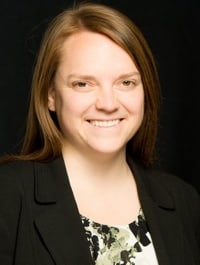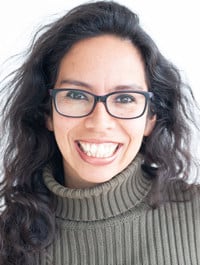The Society of Women Engineers (SWE) Senate is an important part of the Society’s governance and leadership, but what does the role of a Senator really look like behind the scenes?
We sat down with these current and recent members of the SWE Senate to find out more about the Senate, what Senators do, their favorite parts of the role, and their advice for anyone who is thinking about becoming a Senator!
Watch the accompanying video interview with these leaders where we speak more on the time commitment involved, their paths to joining the SWE Senate, as well as their favorite memories and leadership moments from their time as Senators.
Meet Bianca McCartt
 In her role leading the technical development pipeline for the Chief Engineer’s Office at GE Aerospace, Bianca McCartt guides divisional strategy to engage with engineering associations for growth, development, and technical network-building. Currently, Bianca is also on the Board of Directors for the Society of Women Engineers and is an industry advisor to the Women of Color in Engineering Collaborative.
In her role leading the technical development pipeline for the Chief Engineer’s Office at GE Aerospace, Bianca McCartt guides divisional strategy to engage with engineering associations for growth, development, and technical network-building. Currently, Bianca is also on the Board of Directors for the Society of Women Engineers and is an industry advisor to the Women of Color in Engineering Collaborative.
What is a Senator’s role within the Society, and how is it different from other SWE Leadership Roles?
As the strategic body of SWE, roles on the Senate offer unique insights into how the Society serves the organizational mission and vision across all of the many facets of SWE. Senators consider the long-term outlook of SWE, the needs of our stakeholders and the future of the engineering environment to guide leadership at all levels.
This is a significant shift of focus from most roles in SWE where the impact can be more immediate and directly felt, but it serves a key need to ensure that SWE continues grow and evolve. It is particularly interesting to tackle big questions such as how our Society can be more inclusive and better serve the volunteers who give their time to SWE.
What skills do Senators need?
Effective Senators are those who can take a broader view to think expansively about SWE’s mission and look forward to the long-term opportunities, challenges and risks. It is important for the SWE Senate to consider a diverse range of perspectives. Key skills for Senators include effective communication, willingness to explore new ideas and conduct research into trends that are relevant to SWE, critical thinking and self-awareness of your own biases. The Senate also must function as a team, thus Senators must be skilled at building relationships and working with others.
Why did you decide to become a Senator?
My journey to becoming a Senator started as a renewed engagement in SWE via the Affinity Groups. After serving as leader for the Latinos Affinity Group, I started to look at how I could influence change in SWE in a bigger and more impactful way for all members. I had previously served in the Senate’s predecessor, the Council of Representatives, and knew that being elected to Senate would build connections with a wide variety of SWE members across the globe. I was also interested in the strategic focus of the Senate with the opportunity to tackle important issues that shape the future of SWE.
What was the most exciting part of contributing to SWE’s strategic direction as a Senator?
That’s a tough question, because there is a lot to consider after three years on the Senate! Personally, I enjoyed my experience as a co-leader of the FY21 Racial Inclusivity for Society Equity (RISE) subteam with Stephanie Yum. This topic arose out of the events of 2020 when there was a lot to examine in order to make substantive changes as an inclusive organization, and I felt that our team was able to make recommendations that would have a real impact in the long term.
During the following year when I served on the FY22 Annual Strategic Planning subteam, it was gratifying to see our discussions bear fruit in an update to SWE’s strategic goals. Now, every time I share these goals with new SWE members, it feels great to know that I was part of developing them.
What new skills did you gain in your time as a Senator?
Thinking strategically can be challenging when as engineers our training instills a mindset of action-oriented problem-solving. Being on the SWE Senate can help to grow this muscle, especially when the work focuses on the SWE Strategic Plan and Strategic Goals. We don’t often have an opportunity to collaborate on a vision for 20-40 years in the future, so serving on the Senate presents a special opportunity to shift focus into this mindset.
What was your favorite part of being a Senator?
My favorite part of being in the Senate are the relationships that I have built through serving together. It has been a great bonding experience, especially since we have a chance to work across multiple years on the Senate with a truly diverse and dedicated team. I have made many great friendships among my fellow Senators, and I had not met most of them prior to joining Senate.
What advice would you give to someone who is considering becoming a Senator?
It’s natural to start out with a focus on something specific that you think should be fixed and want to direct everyone’s attention to. These issues are usually the tactical ones, and while Senate can be a platform to discuss something like this, the role of the Senate is really much bigger in scope and scale. So, my advice is to let go of your preconceptions about what you’re going to accomplish and be open to exploring a topic outside of your experience.
Meet Kaitlyn Bunker, Ph.D.
 Kaitlyn J. Bunker, Ph.D., P.E., serves as co-director of the Islands Energy Program at Rocky Mountain Institute (RMI). Dr. Bunker has been part of SWE for 17 years and currently serves on the Board of Directors. Her leadership roles have included president of the Michigan Tech Section and the Rocky Mountain Section, collegiate director, member of the nominating committee, and most recently SWE Senator in FY21-FY23.
Kaitlyn J. Bunker, Ph.D., P.E., serves as co-director of the Islands Energy Program at Rocky Mountain Institute (RMI). Dr. Bunker has been part of SWE for 17 years and currently serves on the Board of Directors. Her leadership roles have included president of the Michigan Tech Section and the Rocky Mountain Section, collegiate director, member of the nominating committee, and most recently SWE Senator in FY21-FY23.
What is a Senator’s role within the Society, and how is it different from other SWE Leadership Roles?
A Senator’s role is to be a strategic thinker, looking out into the future and across the global landscape to identify and investigate trends, changes, and opportunities that may impact SWE and our members. Other SWE leadership roles may include aspects of strategic planning as well; the Senate is unique in that strategic thinking is the main focus.
What skills do Senators need?
Senators benefit from skills across the SWE leadership competency model, and especially in areas of collaboration and creativity. Senators spend a lot of time zooming out to the big picture. While it’s natural to want to solve all of the problems or answer all of the questions, the role of the SWE Senate is often to ask more questions and identify high-level opportunities, and then other groups of SWE members or our HQ staff can dig into those more deeply.
Why did you decide to become a Senator?
At the time that I became a Senator, I was also moving into a new leadership position in my work that included setting the strategy for my program and team. It seemed like a great opportunity to build and practice strategic planning skills in two places (my workplace and in SWE) that I could transfer between the two and make greater contributions to both as a result.
What was the most exciting part of contributing to SWE’s strategic direction as a Senator?
Seeing the current strategic plan (developed during my second year as a Senator) be approved was exciting! The plan builds on several years of work by the Senate exploring various strategic topics and adds new aspects onto the foundation set in the previous SWE strategic plan. It was great to be able to contribute to the strategic plan, both directly in the year that it was written and through investigating strategic initiatives in other years that inform all of SWE’s strategic planning.
What new skills did you gain in your time as a Senator?
As the focus of the SWE Senate is strategic work, I gained new skills in strategic thinking and planning. In addition, I was able to build and practice skills in zooming both in and out. For example, shifting between a strategic mode to a more tactical mode to accomplish important tasks like ensuring the procedures document for the Senate was up to date.
Since many of us need to be able to do both types of work, it was great to spend time practicing when and how to shift between modes. This is something I’m continuing to work on after the foundation I started as a Senator. There are many ways to build skills across competencies and advance as a leader in SWE, and in my case, serving as a Senator prepared me well for my current role as Society Secretary on the Board of Directors.
What was your favorite part of being a Senator?
Meeting and interacting with the other Senators from around the world was my favorite part! A particular highlight was participating each year with a different strategic initiative subteam; the teams that I was on formed great connections as we worked together on a specific strategic topic, and I enjoyed learning from the other Senators (on our topic as well as in general about their experiences as engineers).
What advice would you give to someone who is considering becoming a Senator?
Connect with a current or recent Senator and ask more questions! We would all be happy to speak with prospective Senators about our experience. The three-year term for Senators is a significant commitment to consider. I found that the time flew by, and I enjoyed having three different strategic topics to focus on (one each year) as well as the broader strategic discussions that were ongoing throughout my time as a Senator.
Meet Sreyoshi Bhaduri, Ph.D.
 Sreyoshi Bhaduri, Ph.D., is a third-year Senator, FY24 lead-elect for the Career Stages Affinity Group, and a long-time member at SWE. Professionally, Sreyoshi researches the intersection of engineers and technologists, the future of work, and emerging technology. She currently works on Global Talent Management at Amazon and has been honored as an Emerging Leader in Tech (ELiTE) and an Engaged Advocate by the Society of Women Engineers.
Sreyoshi Bhaduri, Ph.D., is a third-year Senator, FY24 lead-elect for the Career Stages Affinity Group, and a long-time member at SWE. Professionally, Sreyoshi researches the intersection of engineers and technologists, the future of work, and emerging technology. She currently works on Global Talent Management at Amazon and has been honored as an Emerging Leader in Tech (ELiTE) and an Engaged Advocate by the Society of Women Engineers.
What is a Senator’s role within the Society, and how is it different from other SWE Leadership Roles?
Through my time as a Senator, I have heard several metaphors of how Senators influence SWE. My favorite has to be the “SWE-as-a-bicycle” metaphor. The Senate is essentially the front wheel of the bicycle. It strategizes the path forward while the back wheel operationalizes how we navigate the current path.
As a Senator, my role has been to think strategically about where I would like SWE to be in the coming years ― who do I want to see as members? What changes do I think leaders need to adopt to strategically plan for the changing landscape of engineering and technology? How are we as a global society best equipped to provide thought leadership to our members on topics that are top of mind? These are the questions at the 10,000 feet level that the SWE Senate works on, intentionally drawing from diverse global voices that ultimately influence operational planning that most other SWE leadership roles are focused on.
What skills do Senators need?
Senators need to be deep and critical thinkers who are okay with pushing themselves outside of their comfort zones to reflect upon SWE’s current state and strategically envision and recommend a future state. Senators need to be comfortable asking the difficult questions, being curious and inviting dialogue and perspectives vastly different from their own lived experiences.
The SWE Leadership Competency Model enlists several skills that Senators continue to build through their tenure. Apart from the skills, I have observed all Senators to be deeply passionate about SWE and committed to bettering SWE’s future presence globally. These traits are at the core of being a successful Senator.
Why did you decide to become a Senator?
After being a decade-long member and having served in various capacities at the Collegiate and Professional Section levels, as well as volunteering as part of Affinity Groups, I had a keen understanding of what was successful and what could be done better at the Section level. I wanted to be able to influence SWE’s leadership and strategic vision. I also wanted to bring in my perspectives and lived experiences as that of a former international student in the United States, an immigrant, and a woman of color in SWE leadership.
What was the most exciting part of contributing to SWE’s strategic direction as a Senator?
Every year on the SWE Senate has been its own type of exciting. The first year was all about contributing through learning and exploring and networking. I have met some lifelong friends through the Senate and am in awe of everyone’s professional and personal accomplishments. We have some wonderfully passionate and driven individuals in SWE leadership!
In my second year, I enjoyed serving as a co-lead for the Future Leadership Experiences subteam with Erica Messenger. The topic was interesting, and our subteam did a great job deep-diving into current experiences and mapping them to future needs and expectations. Some of our recommendations made it into the Operational Planning goals for the year that was presented after FY24 SWE President Alexis McKittrick’s installation — so it was exciting to see how the months of brainstorming, researching, debates, conversations, and strategizing actually influenced operational planning for the year!
This year, I will be leading another subteam, and I am already motivated to take a deep dive into our topic, because I know it will be shared in discussions with the Board. Strategy will lead to action, and intentional action will make SWE better tomorrow.
What new skills did you gain in your time as a Senator?
I continue to hone my communication and leadership skills. It is especially interesting given that SWE is a volunteer organization, so we aren’t all required to show up for meetings or discussions. When folks do show up, as a leader it is my duty to ensure that their time is well spent. I want to make sure that they leave the meetings feeling like they were not only included in the discussions, but that they were also able to actively contribute towards the topics of discussion.
As a result, moderating discussions, making sure everyone gets a chance to speak, providing notes for those who may have missed meetings, and capturing everyone’s recommendations and using them to build on each other are skills that are actively used in the Senate.
What was your favorite part of being a Senator?
Learning from and with each other! We have DEI&B moments every meeting, and each meeting a different Senate member presents a topic close to their heart. Over the months, I have learned about so many things from my fellow Senators, ranging from technical topics to professional development ones ― even ones where I have had the opportunity to deepen my knowledge about a part of the world and different cultures. I truly enjoy these moments to learn something new about the world we live in, ways to work smarter, and fun trivia about my colleagues ― a great start to every meeting!
What advice would you give to someone who is considering becoming a Senator?
Reach out to a Senator to learn more about varied experiences on the Senate, and then apply! To everyone considering becoming a Senator, I’d recommend they learn more about the position by speaking with as many current and past Senators as they can. Find us on the SWE website and reach out to us on LinkedIn.
Through my tenure on the SWE Senate, I have had so many people reach out to learn more about what it is that the Senate truly does. And I think the first step one can take towards this leadership role is a healthy curiosity for the Senate itself and an ability to think big and strategically as we influence the future of this wonderful Society together. The Senate needs diverse voices from passionate SWEple all over the world!
Meet Inga Urbina
 Inga Urbina joined the SWE Senate in April 2021. She has been part of the SWE Finance and Outreach Committees since 2020 and the FY21 SWE Youth Protection Policy task force.
Inga Urbina joined the SWE Senate in April 2021. She has been part of the SWE Finance and Outreach Committees since 2020 and the FY21 SWE Youth Protection Policy task force.
Inga has been a SWE Global Ambassador for Spain since 2018 and is currently organizing the launch of a SWE professional affiliate in Spain with other SWE Corporate Partnership Council companies. She is the Keysight Society of Women Engineers Enterprise Program (KSWEEP) Mentoring Lead, leading a program with US staffing to increase the pipeline of talented young women and keep them engaged until they start working at Keysight.
She is also the Program Admin for Women in Quantum with One Quantum Mentoring Program and a local representative of the Barcelona site Workers Council, specializing in equality.
What is a Senator’s role within the Society, and how is it different from other SWE Leadership Roles?
Senators develop the strategy of the Society, while most other leadership roles focus on the operational side of things.
What skills do Senators need?
Each Senator brings their own unique perspective and experience. They should be able to understand all different points of view and find commonalities to reach a consensus on final recommendations.
They should also have enough time to work on assignments and have the discipline to work on those tasks with their designated group.
Why did you decide to become a Senator?
I was first nudged by Heather Doty, the then-president of the Society, who introduced me to Lisa Rimpf who was a member of the Senate at the time. Lisa explained to me on a one-to-one basis what the role of Senator entailed and encouraged me to fill in the self-nomination.
I thought, “If they are so clear that I would be a good Senator, then I should probably pay attention!”
What was the most exciting part of contributing to SWE’s strategic direction as a Senator?
I enjoyed seeing how proposals get approved by the SWE Board of Directors, and then how they flow down into the operations of the Society.
What new skills did you gain in your time as a Senator?
I increased my organizational skills through being a SWE Senator. I was already somewhat organized, but the level of planning and organization that goes on at all levels of the Senate, from the Senate leadership to every sub team’s work, took my organizational skills to the next level.
What was your favorite part of being a Senator?
I loved the full Senate meetings where we debated topics and started working on common goals — specially the in-person meetings.
What advice would you give to someone who is considering becoming a Senator?
Definitely go for it! The experience can only enrich you. All individuals bring a valuable contribution to the Senate, and you learn so much from the other Senators, Board of Directors and SWE leadership. It is a unique opportunity to experience so much professionalism and talent together in one room, whether virtual or in-person.
Author
-

SWE Blog provides up-to-date information and news about the Society and how our members are making a difference every day. You’ll find stories about SWE members, engineering, technology, and other STEM-related topics.






